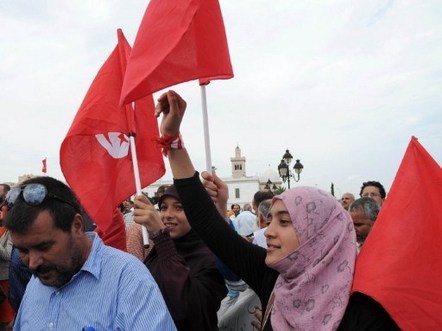Tear Gas Fired in Central Tunisia as Protests Spread
إقرأ هذا الخبر بالعربية
Protesters torched a security post and two police vehicles in central Tunisia on Thursday, Agence France Presse reported, as anti-government protests spread from the town of Siliana.
Hundreds of people demonstrated for a third straight day in Siliana demanding that the government-appointed regional governor step down, raising fears of fresh violence after bloody clashes there on Wednesday that left more than 250 people wounded.
They were angry at the government's failure to improve living standards, and called for funds to boost development, as well as the release of demonstrators arrested in April last year.
In the nearby town of Kesra, police appeared to have abandoned a charred security post by midday, after firing tear gas in a bid to drive back several dozen protesters trying to storm the building, witnesses said.
Two burned out police vehicles lay nearby.
"Around 30 people set the place on fire," said Ali, 17, a youth standing near the building with his friends.
The offices of the ruling Islamist party Ennahda in Kesra were also attacked and documents burned, witnesses said.
Police and hospital sources were not immediately available to confirm how many people were wounded in the unrest.
Protesters in Siliana gathered at the local headquarters of the UGTT trade union, which had called a general strike, before taking to the streets to demand the resignation of governor Ahmed Ezzine Mahjoubi over his perceived failure to boost the poor region's economic prospects.
Similar grievances fuelled the Arab Spring uprising that toppled veteran strongman Zine El Abidine Ben Ali early last year.
North of Siliana, in the Gaafour locality, protesters hurled rocks at police and army trucks heading to the flashpoint town, forcing them to turn back, according to witnesses there.
Clashes in Siliana between police and protesters earlier this week wounded at least 265 people, medics at the hospital said, but the UGTT's local secretary general, Nejib Sebti, said he hoped fresh violence would be avoided.
"There will be no violence because the police have withdrawn, but the governor must go for the strike to end," he said.
Prime Minister Hamadi Jebali insisted in a brief television appearance on Wednesday evening that "this governor is not quitting."
There were no police on the town's streets early on Thursday, AFP reported, even outside the governorate's head offices, which authorities said were attacked the day before.
Stones, burnt tires and the trunks of fallen trees littered the streets in signs of Wednesday's violence.
Shops were closed, and the UGTT said the strike was being observed across the Siliana region, which lies more than 100 kilometers (60 miles) south of Tunis.
"We want a little consideration. We are human beings made of flesh and bones," said protester Maoubi.
The authorities have warned they would crack down on protests if they turned violent, but the police would not interrupt peaceful demonstrations.
Protesters are also demanding action against police officers who fired on demonstrators with small-caliber birdshot on Wednesday.
The Islamist-led government insisted the response to the protests was appropriate.
Security forces "never attack peaceful demonstrators... The principle is always not to cause any deaths," said interior ministry spokesman Khaled Tarrouche.
Nineteen people were partially or totally blinded in the unrest on Wednesday, when protesters again demanded funds to boost economic growth.
Precarious living conditions and widespread unemployment were driving factors behind Ben Ali's overthrow in the first of the Arab Spring uprisings that have since swept the region.
Much of Tunisia's interior suffers from a chronic lack of development, and has seen growing social unrest in the face of economic stagnation and rising discontent over the government's failure to improve living standards.



